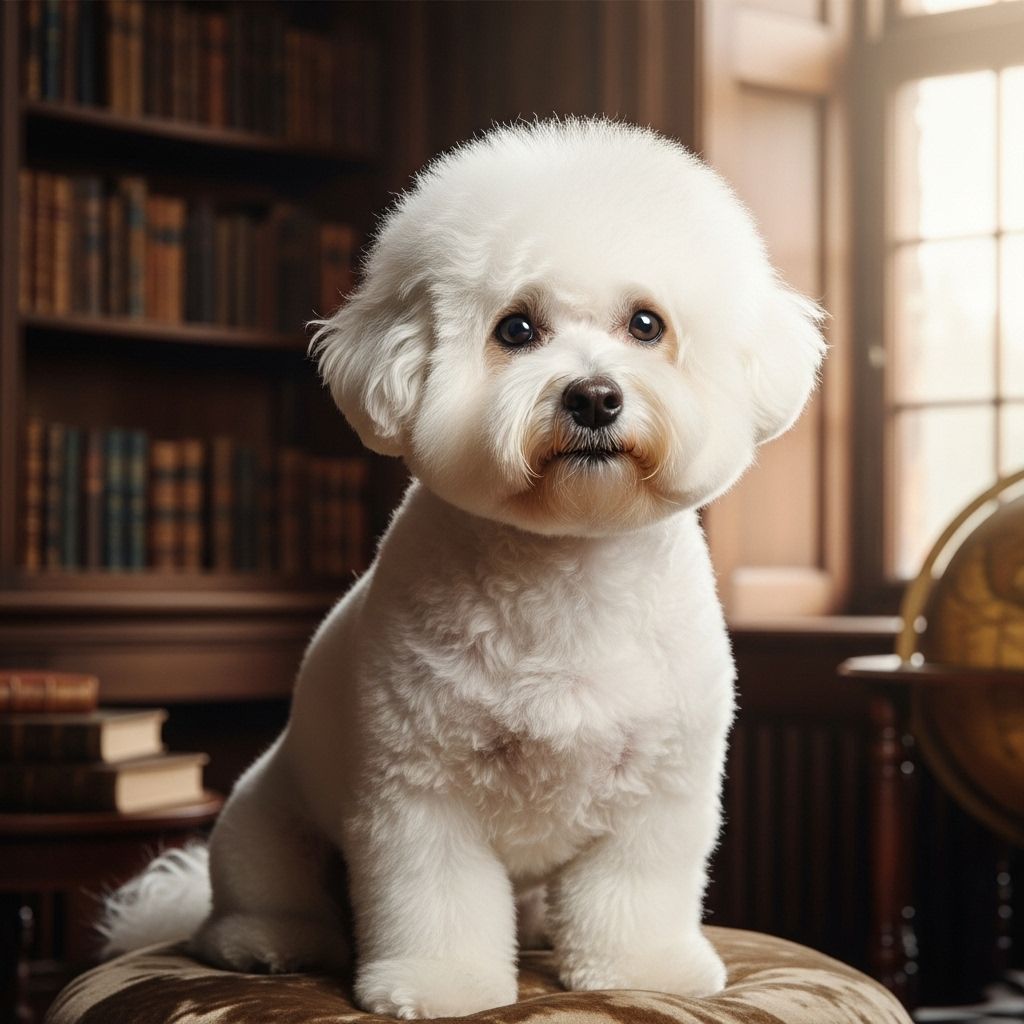Bichon Frise History: Origins, Traits, And Enduring Charm
Discover the charming journey of the Bichon Frise from royal courts to modern homes.

Image: HearthJunction Design Team
Bichon Frise History: Origins, Breed Traits, and Popularity
The Bichon Frise is a small, cheerful breed known for its playful personality and distinctive white, curly coat. This article explores the breed’s rich history, its journey from royal companion to beloved family pet, and the attributes that make it a favorite among dog lovers today.
The Origins of the Bichon Frise
The Bichon Frise originated from the Mediterranean region, with roots tracing back to the Barbet, a type of water spaniel. The name “Bichon” likely comes from the word “Barbichon,” a diminutive form of “Barbet,” reflecting the breed’s small size and gentle nature. Early Bichons were companions to sailors and traders who traveled across Europe, eventually settling in countries like Italy, Spain, and France.
During the Renaissance, the Bichon became a favorite among European nobility. French royalty, in particular, adored these affectionate dogs for their lively personalities and charming looks. The breed’s presence in court paintings and literature underscores its status as a symbol of luxury and companionship.
The Journey to America and AKC Recognition
The Bichon Frise’s popularity declined in the late 19th and early 20th centuries, nearly leading to its extinction. However, dedicated enthusiasts in France worked to preserve the breed, resulting in official recognition by the French canine club in 1933 as the “Bichon à Poil Frisé”—the Bichon with curly hair.
The breed’s resurgence began in earnest after World War II. In 1956, a French couple, Helene and François Picault, brought several Bichons to the United States, marking the start of the breed’s American journey. Their efforts, combined with the passion of other breeders, led to the Bichon’s acceptance into the American Kennel Club’s Miscellaneous class in 1971 and full recognition in the Non-Sporting Group in 1973.
Today’s Bichon Frise: Traits and Temperament
The modern Bichon Frise is cherished for several distinctive traits that make it an ideal companion:
- Hypoallergenic Coat: The Bichon’s curly, low-shedding coat is a major draw for owners with allergies. However, the coat requires regular grooming, including daily brushing and routine scissoring to maintain its appearance and health.
- Trainability and Agility: Bichons are intelligent and eager to please, making them excellent candidates for obedience and agility training. Their quickness and deceptive sturdiness allow them to excel in various dog sports.
- Adaptability: These dogs are highly adaptable and do well in both urban and suburban environments. They do not require extensive exercise, making them suitable for apartment living.
- Sociability: Bichons are friendly and outgoing, getting along well with other dogs and children. Their affectionate nature and loyalty make them excellent family pets.
- Alertness and Watchdog Abilities: Despite their small size, Bichons are alert and can serve as effective watchdogs. However, they are more likely to greet strangers with enthusiasm than aggression.
The Bichon’s Role as a Therapy Dog
The Bichon Frise’s cheerful disposition and gentle nature make it a natural choice for therapy work. Many Bichons have been trained to provide comfort and companionship to people in hospitals, nursing homes, and schools. The breed’s ability to connect with individuals of all ages, particularly children, further enhances its reputation as a therapy dog.
One notable example is JR, a Bichon who, after retiring from the show ring, became a beloved therapy dog with a special knack for comforting sick children.
Why the Bichon Frise Endures
The Bichon Frise’s enduring popularity can be attributed to several factors:
- Happy-Go-Lucky Personality: Bichons are known for their joyful and affectionate nature, bringing smiles and warmth wherever they go.
- Versatility: Their size, temperament, and adaptability make them suitable for a wide range of lifestyles, from singles to families with children.
- Low-Shedding Coat: The breed’s hypoallergenic qualities appeal to pet owners concerned about allergies and cleanliness.
- Show and Competition Success: Bichons have achieved notable success in dog shows, including winning Best in Show at prestigious events like the Westminster Dog Show.
Bichon Frise at a Glance
| Breed Name | Origin | Coat Type | Size | Group | Popularity (AKC 2021) |
|---|---|---|---|---|---|
| Bichon Frise | Mediterranean, France | Curly, Hypoallergenic | Small | Non-Sporting | #47 |
FAQs About the Bichon Frise
Are Bichon Frises good with children?
Yes, Bichon Frises are known for their gentle and friendly temperament, making them excellent companions for children.
Do Bichon Frises shed a lot?
No, Bichon Frises are considered hypoallergenic and have a low-shedding coat, but they require regular grooming to prevent matting.
How much exercise does a Bichon Frise need?
Bichons are adaptable and do not require extensive exercise. Daily walks and playtime are sufficient to keep them happy and healthy.
Are Bichon Frises easy to train?
Yes, Bichons are intelligent and eager to please, making them relatively easy to train for obedience and agility.
Can Bichon Frises live in apartments?
Yes, their small size and moderate exercise needs make Bichon Frises well-suited for apartment living.
Conclusion
The Bichon Frise’s journey from royal courts to modern homes is a testament to its enduring charm and versatility. Whether as a loyal companion, a therapy dog, or a show ring star, the Bichon Frise continues to win hearts with its cheerful disposition, adaptability, and loving nature. With its hypoallergenic coat and friendly personality, the Bichon Frise remains a beloved choice for dog lovers seeking a small, affectionate, and entertaining breed.
From the Mediterranean to the Americas, the Bichon Frise has proven that great things truly do come in small packages.
References
Read full bio of Shinta












